Make no mistake. The last thing Sitiveni Rabuka wanted arising out of the Supreme Court review was a return to the 1997 Constitution, even though that was the position of his own party, the People’s Alliance.
As with Frank Bainimarama before him, he owes his position to the “big man” provisions of the d’Hondt electoral system enshrined in the 2013 Constitution. In fact, Rabuka and Bainimarama arguably remain the sole two Fijian political leaders capable of securing a mass vote to this day.
It’s why Rabuka was the only choice to lead the People’s Alliance into the last election and will be the reason he does so into the next. And why it is so hard for any other would-be leader to break through the pack and take a whole lot of lesser names across the line with them on polling day.
A return to the 1997 Constitution would have meant the end of the national constituency and a return to the individual regional constituencies of the past. This happens to be the recommendation of the electoral review conducted by Dan Fatiaki and Professor Waden Narsey. And if you’re wondering why that isn’t going anywhere either, it’s because it doesn’t suit the Prime Minister at all.
It would take away his “big man” status under d’Hondt and reduce him to being just another constituency MP – the member for Cakaudrove or whatever. And axiomatically make it much easier for another People’s Alliance MP to challenge him as leader in the party room.
As it is, the PAP needs Rabuka to win again and he knows it. With the only viable challenger, Manoa Kamikamica, up to his neck in a FICAC investigation and facing the very real prospect of a jail term, Rabuka will coast into the 2026 election as PAP leader and on present indications, is by far the best bet to win.
What happens after that is another matter. There’s a time bomb ticking away on the Prime Minister’s wrist in the form of his $150,000 gold Rolex watch. Where did he get it from? He refuses to say. But it is bound to eventually be the subject of a FICAC investigation under a new government. And if the latest rumours are true that it was a gift from Lynda Tabuya to secure Tabuya’s return to the cabinet, both of them could eventually wind up behind bars. But we are getting ahead of ourselves.
There was a brief flutter of excitement and relief among the minorities yesterday when the Supreme Court decision was announced by the rogue Chief Justice, Salesi Temo. “The 2013 Constitution stays!” “Equality wins!” flashed hundreds of text messages. Yet it hasn’t taken long for that initial euphoria to dissipate. Because while the Supreme Court said “no” to a return to 1997, the government has got the second-best thing – a new mechanism to alter the Constitution and change any provision it doesn’t like, including the common and equal citizenry.
Instead of having to secure a three quarters majority in the parliament and three quarters majority in the electorate through a referendum, it now needs only a two thirds majority of the parliament and a simple majority in a referendum (above 50 per cent) to secure change. And on both counts, it should have no trouble securing that.
It only just fell short of the 75 per cent majority in the parliamentary vote back in March so the two-thirds is already in the bag. And assuming popular sentiment to change the 2013 Constitution holds up over the coming months riding the current wave of government propaganda, change is definitely coming at the ballot box as well.
That’s why a pall of gloom soon fell over supporters of the 2013 Constitution after the initial joy that the supreme law had been saved. The government now has the numbers in the parliament and the country to upend its provisions, though there’s still some doubt about the manner in which this would happen.
Will any referendum question be a simple “Do you want the Constitution altered?” or will the government have to detail its precise wish-list? Such as “do you want the common and equal citizenry changed?” Or “do you want everyone to be called ‘Fijian’ or just the iTaukei?” etc. Se bera ni macala (it isn’t yet clear). But the reason for much of the despondency among the minorities last night was precisely the uncertainty of it all. And the realisation that some of the constitutional protections cast in stone by Frank Bainimarama and Aiyaz Sayed-Khaiyum with their 75/75 requirement for change have suddenly turned to jelly.
Some legal purists were insisting before the Supreme Court’s decision that the judges didn’t have the authority to change anything other than by the 75/75 provisions already laid down. But they have done so anyway, asserting the validity of the 2013 Constitution but setting a much lower bar for it to be altered. And given the current make-up of the parliament, it is now obvious to everyone that they have paved the way for fundamental change.
Is the common and equal citizenry safe? The fundamental right to equality that has been enshrined in the supreme law for the past 12 years? In the glaring absence of assurances from the Prime Minister, we have to assume the answer is “no”. It is not safe at all. And that is a tragedy for Fiji because many people had already lost confidence that they have any place in national life beyond being mere “vulagi” or visitors. The message is now going out that however much they thought they “belonged” under the 2013 Constitution, that is no longer guaranteed. And they will be making their plans accordingly.
All hope has also gone that the RFMF would protect the common and equal citizenry under Section 131 of the Constitution and its reference to the “well-being of all Fijians”. With the Supreme Court’s rejection of any return to 1997, there is no longer a threat to the immunity provisions that protect those who took part in the 2006 coup. And that’s all the military appears to care about.
In the days leading up to the Supreme Court decision, what has the RFMF Commander, Major General Ro Jone Kalouniwai, been doing? He’s apologised to the Methodist Church and the people of Bua for any hurt the RFMF might have caused them. In other words, apologised to iTaukei. Yet as for an apology to Indo-Fijians for the hurt caused to them since Sitiveni Rabuka’s coup of 1987, no such luck.
Now the certainties of 2013 are gone. Frank and Aiyaz are before the courts and look almost certain to spend years behind bars. And there is a big question mark hanging over their supreme creation, the Constitution that finally guaranteed equal opportunity for all Fijians irrespective of ethnicity or religion. Correction. Make that Fijians (iTaukei) and Fiji Islanders (the rest of us) because the common identity provisions of 2013 are now also on the line.
Where will it all end? Who knows? But the biggest tragedy of all is that at the very time Fiji needs its best and brightest most, the exit signs are flashing more brightly than ever before. For anyone with a portable skill who is tired of the whole shebang – and for non-iTaukei, the fundamental absence of any genuine sense of belonging – better places beckon. Better jobs, better pay, better education, better health care, better social security, a better future for their kids.
We’ve learnt in the past week that Fiji is struggling to get over the million mark in terms of its population yet is now encouraging more people to leave. Isa. Viti lailai. Little Fiji. A nation that once held such promise yet has spent the past four decades in a state of arrested development squabbling over the spoils. Little Fiji. Where happiness finds you if you are happy to spend money and leave but for the perpetual outsiders within, is a land of broken dreams.
We desperately need a national saviour. Not Jesus or any other religious leader but another “big man” (or woman) of genuine integrity who isn’t a snake and is capable of gaining a mass vote, unifying the nation and finally digging us out of this mess. But who?
—————–
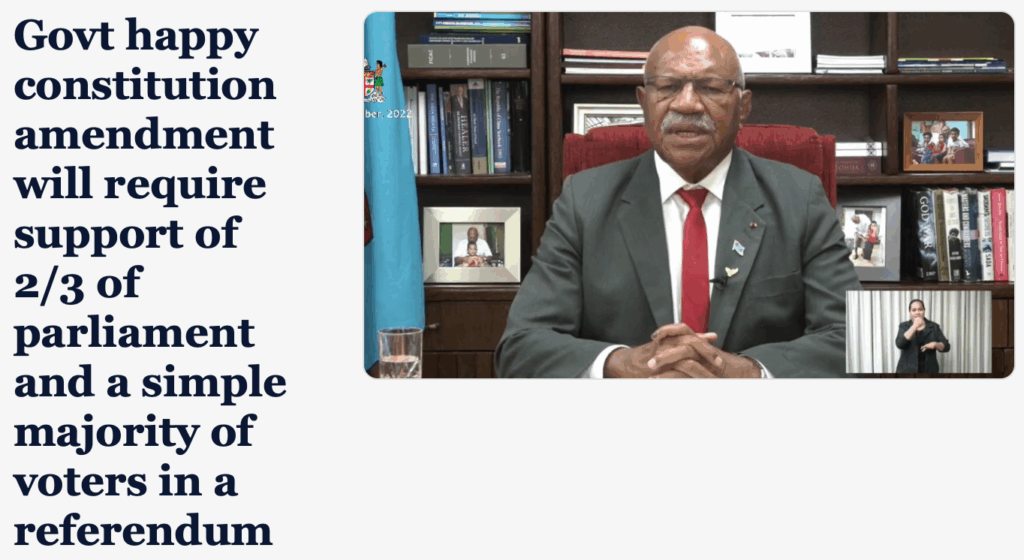
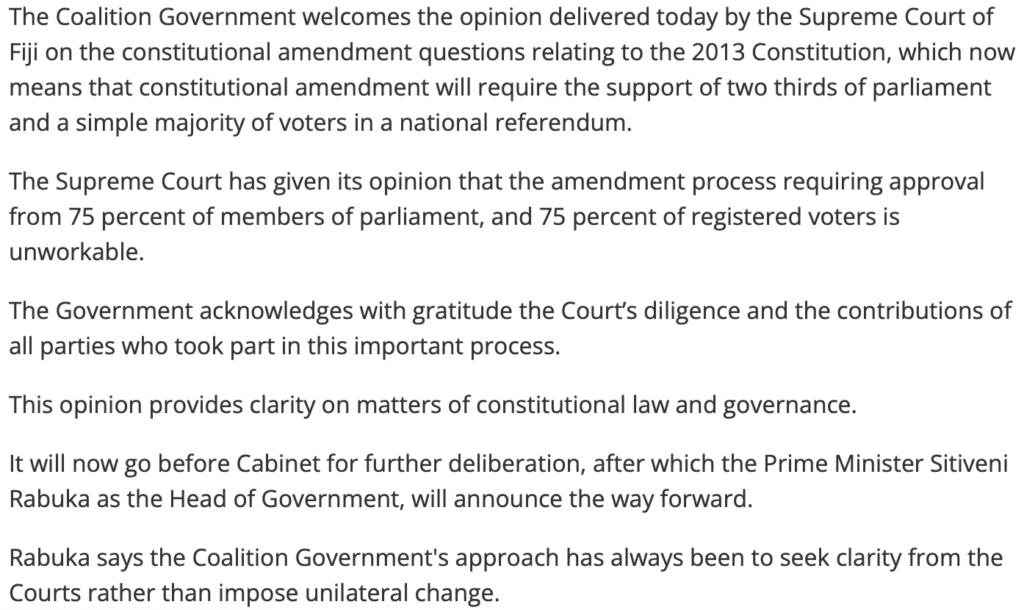

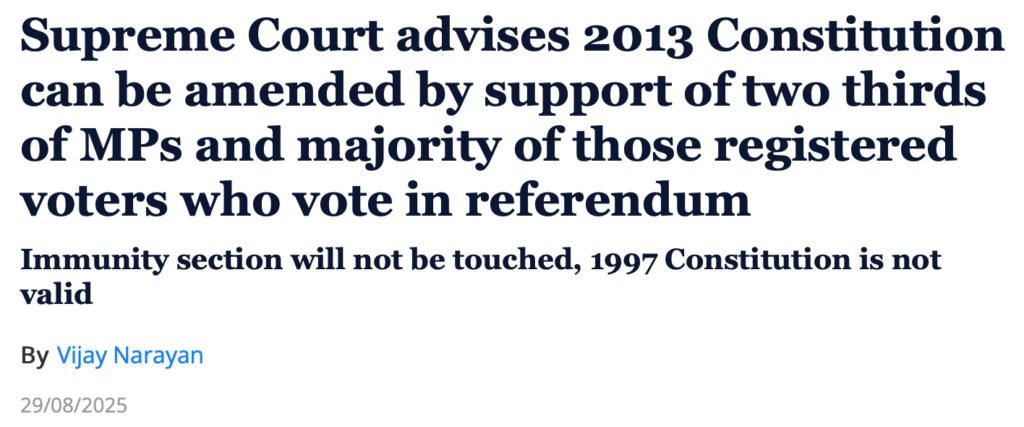
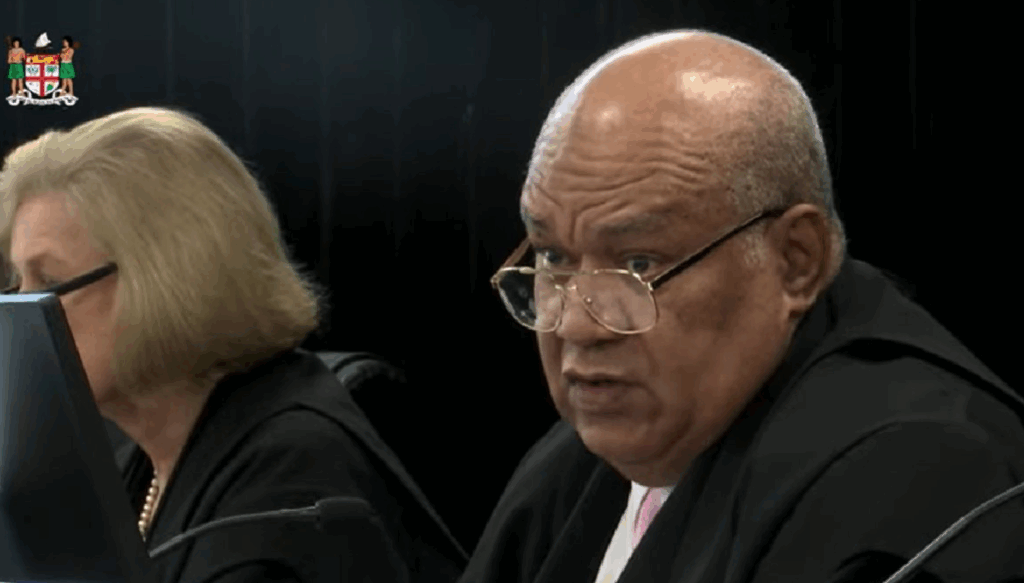

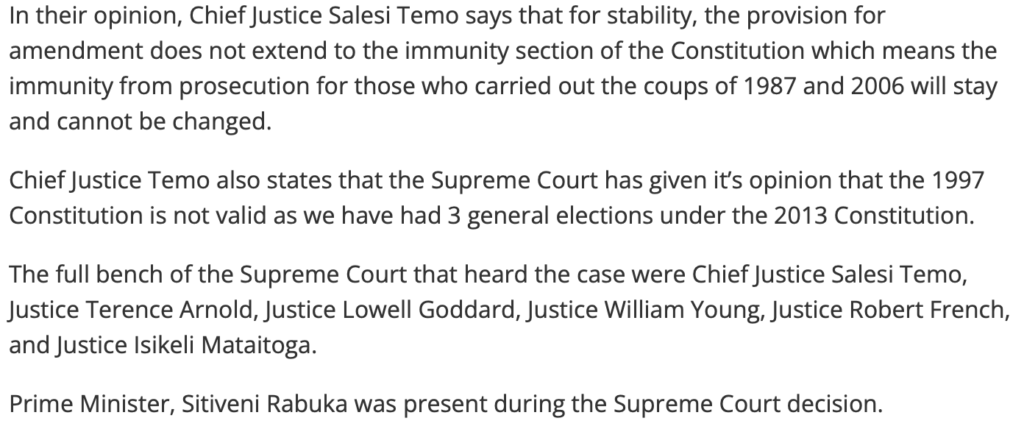
The Great Betrayer falls into line behind his leader and seals his fate in the process.
Politically with sentiments like this, Biman Prasad is a dead man walking.
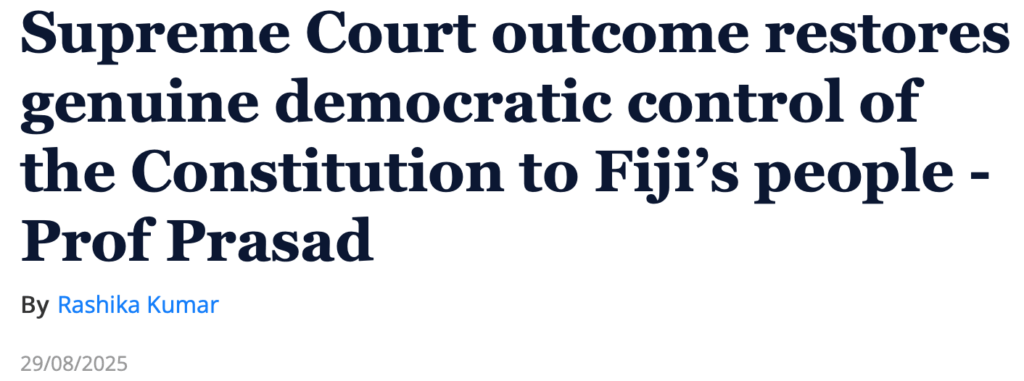
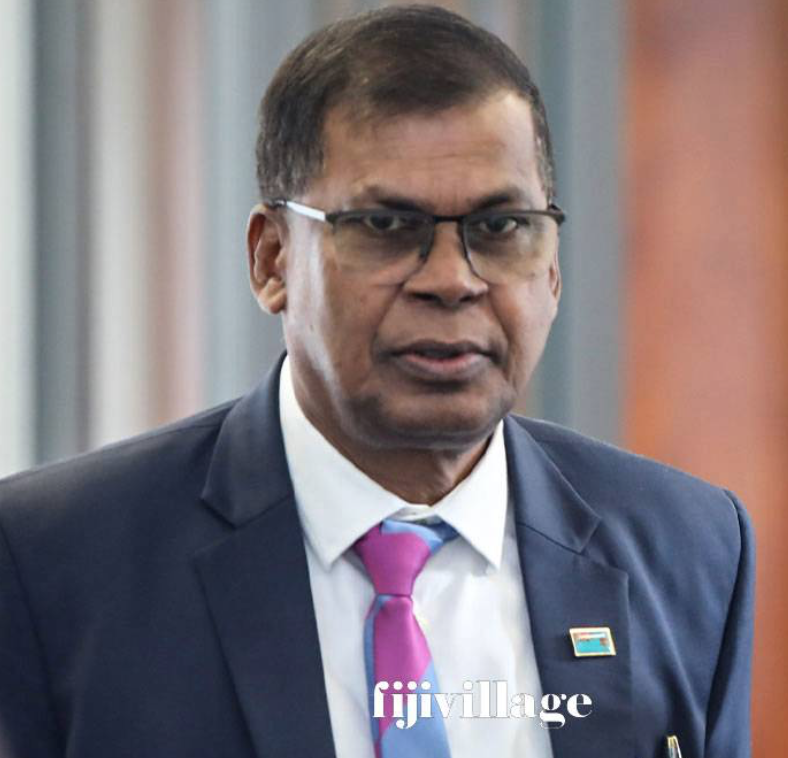
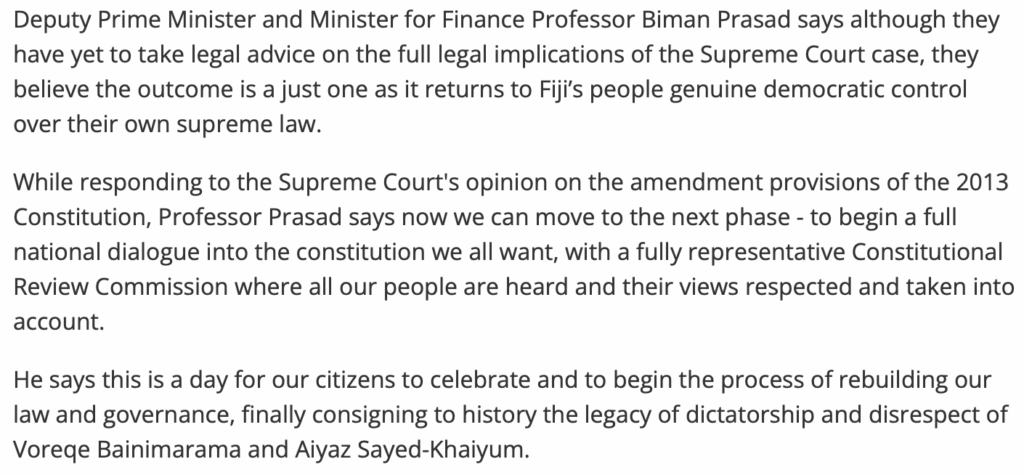
The battle lines for the next election are being drawn, with Mahendra Chaudhry establishing himself as the defender of the rights of the minorities. As things stand, Labour is the big beneficiary of the NFP’s disastrous decision to side with Rabuka.
As a prominent member of the Indo-Fijian community told Grubsheet last night: “Indo-Fijians have abandoned Biman altogether and will give their votes to Mahen unless a third force emerges in the meantime”.

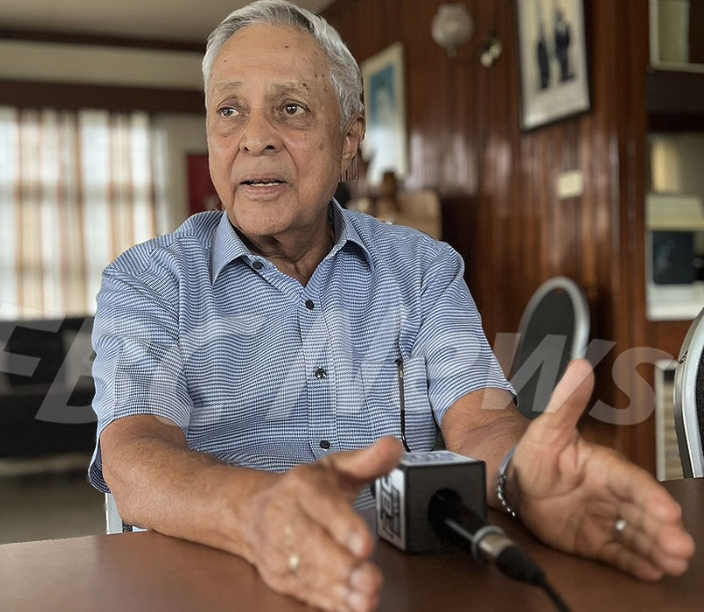
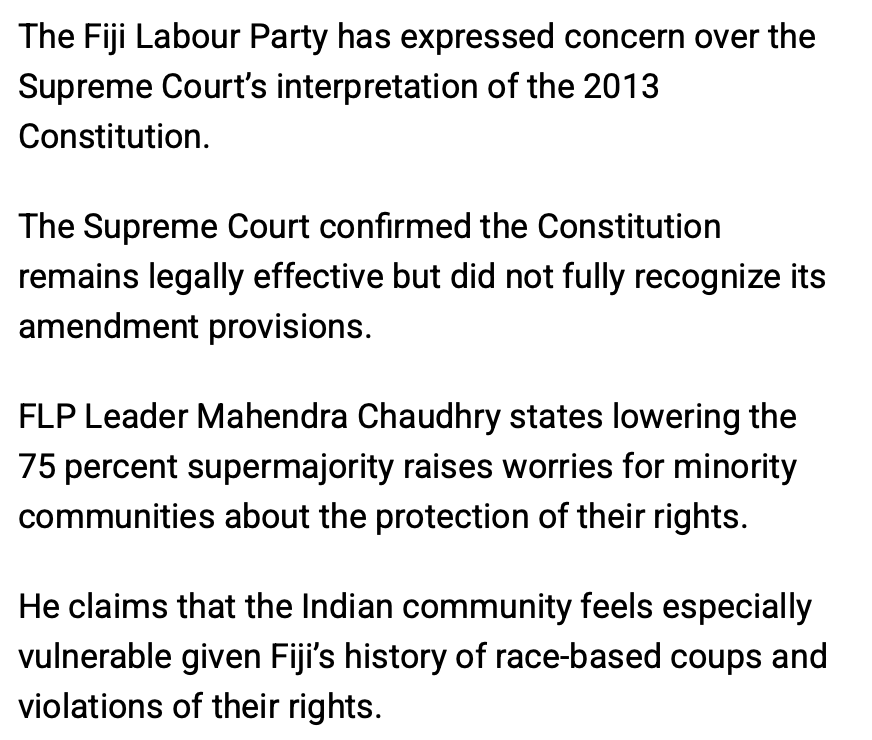



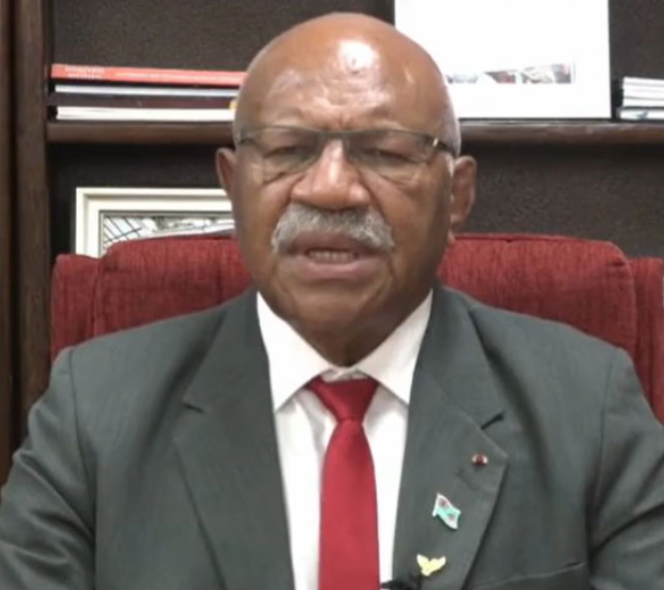
Fiji is so ripe for the con and plunder by India and China as it is now desperate for cashing up due to the brain drain and exodus of its best. Watch this space.
Areh if you must keep using Fijian phrases to impress people with the sense that you know the culture inside out, you may as well get them right. Sa bera = (it is) late. Se bera = (it is) not yet, which is the one you want in this context. Since you use this phrase every few articles I’ve just saved you some embarrassment in future, you’re welcome
If you think I am remotely embarrassed about being corrected, you are very much mistaken. Fijian was my first language as a child and my late father was fluent all his life. So this and phrases like it have long been part of my vocabulary and whether I haven’t mastered the odd “e” instead of “a” in written form surely shouldn’t be a deal-breaker.
Do I criticise my correspondents for their imperfect command of English in these columns – the chronic absence of articles – or accuse them of using English to impress? No, I just tidy up the more extreme examples in the hope that they will note the changes and learn from them without the prissy cultural and lingual putdown of a pedant trying to score points.
Duly corrected. Vinarkar.
Sukhria bhaiya
You’re welcome.
If you are going to attempt Hindi or Urdu, should you not take a bit of your own advice? There is a quite a difference between sukh(ria) and shuk(ria). I prefer the aryanised dhanya baad ( you will notice the closeness to other indo- aryan words such as danke or even the English thanks.
Many Binakarse.
Many Binakarse.
Hahaha! Hahahahaha!
The difference is, they’re not using English for cultural capital in the the way you’re using Fijian.
And it’s not just a letter it’s a whole different word.
God shave the Queen!
A point-scoring pedant and cultural snob. Fijian for the Fijians because its theirs. English word but it’s theirs anyway.
Well may we say God Save the Queen,
because nothing will save Sitiveni Rabuka on Judgement Day.
Yes, a great line by Gough Whitlam when he was sacked by Sir John Kerr in 1975. It was God SHAVE the Queen from our anonymous pedant. Something Rabuka did back in 1987.
How ironic that he wants the people consulted now on a new constitution but got rid of the monarchy – na Ranadi ni Viti (Queen of Fiji) – without a second thought of consulting anyone 38 years ago.
History will not treat this bastard well. Nor the fawning Coolie who backs him at every turn and will join him in the political afterlife as proven liars and betrayers to the cause of an inclusive, united Fiji.
Isa GD, sa bera. Rambo showing the experience of an old salt at the wheel.
All the smokescreen about the electoral review is just another report for the dusty shelves.
The real change is changing the rules to align voting with candidate rules, so if you haven’t been in Fiji for the last 2 years, you won’t be able to vote especially if you hold PR in other countries.
And if you’ve ever been convicted of any criminal offence, you won’t be able to stand in any election in the future, so out goes Mahen 😁.
So much about Fijian and Fiji Islander, Rambo is not bothered about that. The 1st constitutional change is making the RFMF subservient to military rule, so you can stop harping about the Commander after that.
So just sit back and relax and watch the big men bring about real democracy. Set, talo mada
Word…..so if you haven’t been in Fiji for the last 2 years, you won’t be able to vote, especially if you hold PR in other countries. End.
If that provision were to be applied these days, it’d mean a significant number of potential itaukei will be excluded.
But then, there’s always room for erections, er, elections, to be rigged.
The large numbers of itaukei diaspora will be sorely needed the by ethno-nationalists to garner votes.
One could safely venture to suggest that there’s now equal numbers of itaukei and indo Fijians among the diaspora.
The Indo-Fijian diaspora will be turned away at embassies and high commissions, while the itaukei votes will be cast and counted.
A proper erection indeed.
If we remember, the last time the Snake had a gold rolex and tried to pull this trick post 1987, to disqualify Indo-Fijian diaspora from voting he not just inadvertently excluded the itaukei but even made one prominent lady chief stateless! True story.
Anonymous, you forgot to put a full stop at the end of your sentence.
Vinarka varka levoo
Semantics aside, the die is cast for the completion of 1987 in 2027. Exodus will be welcomed of all minorities until Fiji returns to its original monocultural past. Christianity will be part of that reversal for the Israelites will have finally secured the promised land. And the ethnic minorities will have leafy suburbs in Babinda or Tauranga to sip kava and reminisce about nogu Viti..
Once Upon a Time. Jai Ho….Hallelujah.
I think if this was another time in history, with another government, making the alteration to have the Constitution more flexible (not that I believe the Supreme court “opinion” has jurisdiction to do this) would be an admirable thing.
It is just the current context and manipulative agenda that makes this change ominous.
It feels more ominous if we assume that the majority of voters would agree to archaic and dangerous changes to the constitution. If we peddle this assumption and scare the remaining minorities out of Fiji, perhaps this is even more likely to happen.
Perhaps we need a little more faith in Fijians to give the situation any hope. This forum, thanks to Graham, has the chance to educate voters against any dangerous referendum choices.
But the Fijians of all persuasions have lost so much faith that there’s a real fear that not enough will turn out on voting day.
Fiji doesn’t need a saviour , it needs a leader with a good solid team or someone capable of attracting a good solid team .
Yes where will the next leader come from ?
Fiji is ripe for a generational political change ..someone in their early 40s would be ideal as they have energy and less likely influenced by historical baggage and old enough to have life experience. Someone to inspire the next generations is critical.
That sounds like a saviour to me. Someone to save Fiji from the bottomless abyss it now faces. And, yes, with a good team behind him or her. But realistically a “him”.
FYI, from the Oxford Dictionary:
Saviour
noun
a person who saves someone or something from danger or difficulty.
As has been said the die is cast and there will undoubtably be a Referendum to change the 2013 Constitution.
The question(s) is change what and what will the voters of Fiji be asked to vote on.
Will those who seek change have to spell out exactly what they want to change when the Parliament is asked to vote?
Will the voters be told exactly what will change and what that actually means?
Will there be a requirement to publish what changes are being sought, including any negative outcomes for some voters?
As for the Referendum itself, the Fiji Election Office will conduct the ballot, but there is nothing in the Electoral Act on how that is to happen. Maybe the Parliament needs to pass separate legislation for this!
That legislation will need to be very specific on the ballot paper, the question(s) the voter is vote on and how they vote. It will also have to be specific about the case for change, or no change is put to the people, so to ensure we don’t have Government using its unlimited resources to drown out any opposition.
The Australian Constitution can only be changed by Referendum and there is a specific Act of Parliament that to conduct a Referendum – Referendum (Machinery Provisions) Act 1984, which spells out how that is precisely to happen.
I expect similar legislation in Fiji!
Is it die or dye has been cast? I’m kidding!
The Judges of the SC who were on the bench proved how dumb they are. The SC ruling is an open ticket. The Parliament can do whatever it wants to do provided that 2/3 votes in Parliament and simple majority for refrendum is met. They can rewrite the whole Constitution. Say have vote in Parliament for Review if the Constitution and a referundum to have a new Constitution. Where will it leave the 2013 Constitution which the SC now recognises.
Apart from underscoring Rabuka’s racist and ethnonationalist agenda, the court case and the various submissions have also helped understand where the various parties stand for. PAP’s extreme ideology, notwithstanding Rabuka’s vained attempt and ameliorating is neither here not there. After all any decisions from PAP, be it relating to the Tabuya, Radrodro or GCC, has been changed to suit the agenda. PAP showed its true brand,
One cannot take the main seriously at all given his history of inconsistencies and lying. The incompetency and trying to remain relevant was so apparent in his interviews in New Delhi. He thinks pedaling the plagiarized ‘Ocean of Peace’ will make him credible. What a joke.
The Unity Fiji’s submission and the subsequent commentary by Narube and lackeys like Tukana should help many of us enlightened Fijians better understand who our generation can trust to advance the nation’s enviable recognition as the most ethnically diverse and ‘advanced’ country in the Pacific.
We may not have the platforms to be heard through the media etc but we are not deaf to what is happening around us and we sure would vote with our feet next year.
In Fiji you could have the most honest and morally upstanding person in the country standing for PM, but if he doesn’t go around, pre election, and give out free food and tee shirts, he wouldn’t have a hope in Hell of getting into power.
The decision by the Supreme Court was expected. Why do you think PM and his team were so keen to get the Supreme Court to decide on the 3 quarters majority and referendum. With how the rogue CJ has gone about deciding matters concerning former FF members but personally getting involved, he would have had a hand in “assisting” Rabuka and his government.
It was obvious from Judge Mataitoga’s comments who was shafted by the former FF government that he had an axe to grind.
Did the judges ask if the government had gone out and tried the 3 quarters referendum from the people? All Rabuka and his government said that it was impossible. Usually you need exhaust all available avenues then you decide to come to court.
But Rabuka knew they had the racist rogue CJ on their side hence it was given that the main issue would be resolved and that was to reduce the quarters majority.
Forget about the RFMF adhering to the rule of law. They are more concerned with asking for forgiveness from chiefs as the Commander himself is a chief and nephew of Ro Temumu Kepa. He is now basically doing what he is being advised by his high chiefs.
Have the RFMF gone to the Indians and sought forgiveness from those that suffered through the 2000 coups? It beggars belief that an institution such as the RFMF have now become pawns to this current racist regime.
All in all, get ready for major changes to the Constitutions. GCC being empowered with more power, minorities being marginalized, more right and obligations to the i-taukei and who knows Fiji being declared a Christian State. Everything thing is possible with Rabuka being at the helm
And don’t hold your breath, we may not have an election next year as Rabuka and his cronies will want to rule under a caretaker government shorn of NFP and SODELPA.
Rabuka was quick to celebrate the Supreme Court verdict—he got exactly what he wanted.
Hot on his heels, Biman Prasad wasted no time rushing out a press release, falling over himself to support the Prime Minister and applaud the ruling.
In his eagerness, he even dragged in the names of Bainimarama and Khaiyum, proclaiming that “this is a day to celebrate and to begin rebuilding our law and governance, leaving behind the legacy of dictatorship and disregard under Frank Bainimarama and Aiyaz Sayed-Khaiyum.”
But Biman’s selective memory betrays him. He has conveniently forgotten that under Bainimarama and the 2013 Constitution, all Fijians—including Indo-Fijians—were treated as equals, enjoyed real security, and experienced unprecedented progress. Biman himself has gained under the 2013 Constitution.
The truth is that the marginalization of Indo-Fijians began only after this Coalition took office.
Now, with this verdict, Indo-Fijians and other minorities are set to face even deeper exclusion—and Biman must shoulder the blame for what is to come.
Mark these words: in the months ahead, Biman will continue to humiliate and diminish the Indo-Fijian community, sacrificing their dignity for his greed and personal gain.
While Rabuka works openly to elevate the iTaukei as a superior race, Biman is quietly consigning his own people to second-class status. His betrayal is not by accident—it is by design.
Baiman wants to retain the keys to the teejori (safe) at all costs. What a low-life sell-out. With friend like this bastard, the Indo community needs no enemies.
Khada Gawah. Kyrie eleison.
Better roads
Better Eduction
More jobs
Better Health care
Affordable house and property
Law and order
A liveable wage
Reduce the cost of living
I don’t think any amendment will help with any of the above or water cuts.
Rabuaka and PAP won’t have it easy. They still have Biman and NFP to reckon with.
What, the boot-licking Biman? You are completely deluded.
Ye of little faith, Graham.
Underestimate Biman at your own peril. He is a powerhouse!
Yes, Biman. Whatever you say.
The august Supreme Court (SC) advisory on Fiji’s constitution has significantly reshaped the country’s pathway for constitutional reform, highlighting deep issues of political power and race-based governance in Fiji.
SC ruled that the previous requirement—approval from 75% of both Parliament and all registered voters to amend the 2013 Constitution—was “unworkable.” Instead, constitutional amendments now need a two-thirds majority in Parliament and a simple majority in a national referendum. The court reaffirmed the validity of the 2013 Constitution, despite its imposition without popular endorsement and emphasized its centrality in Fiji’s legal and political structures.
CJ acknowledged the democratic deficit at the Constitution’s origins but noted its entrenchment via three national elections and extensive legislation. The ruling rejected claims that the court should or could rewrite the Constitution itself, maintaining judicial restraint and respecting legal continuity.
Racial politics have been a longstanding feature of Fiji’s governance. Historically, constitutional and governmental structures have been shaped to favor indigenous Fijian political dominance, often at the expense of Indo-Fijian and minority rights. Political actors have exploited these divisions for strategic advantage, frequently justifying power grabs under the rubric of indigenous supremacy or to resist perceived threats from minority communities.
The current discourse suggests that key leaders—described by critics as manipulative “snakes”—have perpetuated these racialized structures, appointing loyalists across government branches to consolidate control and pursue old political objectives rooted in the legacy of the 1987 coups.
The new constitutional amendment process, though more flexible, also carries risks. Critics argue that reducing protections against majoritarian rule makes it easier for the dominant political bloc to manipulate constitutional changes, potentially undermining checks on power and minority protections. This “power of one”—where a single party or leader wields disproportionate influence—allows for systemic entrenchment, disenfranchising dissenting communities and exploiting minorities for personal or group gain.
Minority representatives are sometimes seen as complicit, using their positions for self-enrichment rather than genuinely advocating for their communities’ rights and freedoms. Such dynamics amount to an abuse of power, creating a facade of democratic process while reinforcing authoritarian norms and perpetuating inequality.
On reflection, the latest SC advisory provides a legally clearer, somewhat more democratic mechanism for amending Fiji’s Constitution, but it also exposes—and may even worsen—the underlying reality of racial politics, elite capture, and institutionalized dominance. This outcome reflects both the progress and enduring challenges Fiji faces as it navigates constitutional governance, national identity, and equitable representation.
The integrity of the Fiji Supreme Court’s proceeding on the 2013 Constitution is fundamentally compromised by the conduct of its bench, presided over by Chief Justice Salesi Temo. Justice Isikeli Mataitoga, a direct beneficiary of the immunity clause under examination, participated in the case without recusing himself or declaring his significant personal interest. This is a clear violation of the foundational judicial principle of nemo iudex in causa sua—that no one should be a judge in their own cause.
Chief Justice Temo, as the presiding officer of the court, bears ultimate responsibility for this ethical failure. It was his duty to ensure the integrity of the proceedings, which includes identifying potential conflicts of interest and reminding fellow justices of their obligation to recuse themselves where appropriate. Justice Mataitoga’s prominent role in the 1987 coups was a matter of public record and common knowledge within Fiji’s legal and political circles. Chief Justice Temo’s failure to recognize this conflict, or his willingness to ignore it, represents a profound dereliction of his duty and throws the entire process into disrepute.
Therefore, the Supreme Court’s opinion on the immunity clause cannot be seen as impartial or legitimate. The combined failure of Justice Mataitoga to declare his interest and step aside and Chief Justice Temo to enforce recusal protocols irreparably taints the judgement, exposing it as a process where key adjudicators had a vested interest in the outcome. This breach casts a permanent shadow over the Court’s ruling and severely undermines public confidence in the judiciary’s commitment to justice over self-interest.
The Fiji Supreme Court’s handling of the 2013 Constitution case is a mess, and it’s largely because of Justice Isikeli Mataitoga’s past and Chief Justice Salesi Temo’s failure to step up. Here’s why this whole thing stinks.
Justice Mataitoga isn’t just some random judge—he was deeply involved in the 1987 coups led by Sitiveni Rabuka. We’re talking about a guy who showed up to Taukei nationalist meetings in Nabua, where they cooked up plans to topple the elected Bavadra government. He wasn’t just cheering from the sidelines; he was all in for this push to put indigenous Fijian power first, which was the whole excuse for those illegal power grabs. And after the coups? He got a sweet gig as Director of Public Prosecutions under Rabuka’s government.
In that role, he went after pro-democracy activists who’d fled Fiji, using the law to prop up the coup regime and silence its enemies. So, when the Supreme Court is looking at the immunity clause—the very thing that protects people like him from being prosecuted for coup stuff—he’s got a massive personal stake in it.
Here’s the problem: judges aren’t supposed to sit on cases where they’ve got skin in the game. There’s this basic rule in law—nobody should judge their own case. It’s like, imagine a referee playing in the game they’re supposed to officiate. Globally accepted standards, like the Bangalore Principles, say a judge has to step aside if there’s even a whiff of bias, especially if they stand to gain from the outcome. Mataitoga didn’t just forget to mention his coup history; he sat there, judging a case that directly affects whether he stays immune from prosecution. That’s not a small oops—it’s a huge ethical fail that screams bias and wrecks the court’s credibility.
And then there’s Chief Justice Salesi Temo, who was supposed to keep things above board. As the head of the Supreme Court, it’s his job to make sure the process is squeaky clean. Everyone in Fiji’s legal world knows about Mataitoga’s coup involvement—it’s not some buried secret. So why didn’t Temo do anything about it? He either missed it entirely or just let it slide, and either way, that’s a massive failure on his part. He’s the one who’s supposed to catch these conflicts and make sure the court doesn’t look like it’s playing favorites. By letting Mataitoga stay on the case, Temo basically greenlit a process that looks rigged.
So, what’s the fallout? The whole Supreme Court ruling on this immunity clause is tainted. You’ve got a judge who benefits from the outcome sitting on the bench, and a Chief Justice who didn’t bother to stop it. That’s not just a bad look—it obliterates any trust people might have had in the decision. It feels like the court was more interested in protecting its own than delivering real justice. The ruling’s legitimacy is shot, and it’s hard to see how anyone can take it seriously when the people making it had such an obvious bias.
What I cannot comprehend is that the other three kaivalagi judges sat on the same bench with two very dodgy judges with a history of bias, prejudice and a heap of serious findings by the COI report.
Why didn’t these three judges speak up? Aren’t they aware of the history of the other two local judges. Lack of independence, ethics and professional conduct for all to see except the three kaivalagi judges. My mind boggles. Did they just sit on the bench to get some spare money in a third rate, third world court and no one will notice?
Of course the whole thing is tainted and should be assigned to the bin.
https://youtu.be/sFUMGrqH7-E?si=qPb_d4pr1wjXmPyp
So everytime a Constution is amended or abrogated and replaced it has to be sanctioned by the Supreme Court before it is made effective. The ” Supreme Court ” recognises the Constitution which
remarks made in the recent case.
Of course, as your headline trumpets, the perpetual coup maker and arch plotter par excellence, Rabuka got exactly what he wanted: The proposed change in Fiji’s constitutional amendment process from a 75% parliamentary and referendum approval to a two-thirds parliamentary majority and simple majority referendum that undermines key constitutional safeguards. The ease of amendment raises the possibility of itaukei, who comprise 67% of the population, being swayed by radicalised chiefs in the Great Council of Chiefs (GCC) to vote to alter or even do away with entrenched provisions such as freehold land, risking concentrated political power and weakening the Constitution’s role as a stable, consensus-based supreme law.
This concern is exacerbated by a compromised judicial process, as Justice Isikeli Mataitoga’s involvement in the 1987 coups and prosecution of pro-democracy activists creates a clear conflict of interest in judging the immunity clause protecting coup perpetrators like himself, which Chief Justice Salesi Temo failed to address, allowing a biased process that further erodes the Court’s credibility and deepens public mistrust in Fiji’s constitutional democracy.
FLP can win in a landslide if the leader brings in the succession plan of the party. This is what people have been waiting for, at present supporters and potential supporters are in dark as to who will lead after MPC. A good successor means a sure shot victory.
Let’s agree that in 2013 a Constitution which any truly democratic country would envy was brought in somewhat undemocratic manner by 2 people who believed they would rule forever. Because Temo et al wanted 1997 Constitution restored, he and Itaukei powerbrokers will spend millions in bringing about changes…while the necessary needs of the people are neglected and the country burns.
How can the Supreme Court conclude that amending the Constitution is “difficult” without the process ever being fully tested?
The Coalition government’s proposal to amend the Constitution was only attempted once in Parliament and nearly secured the required 75% majority.
As for a referendum, it has never been tried—so on what basis does the Court declare the amendment provisions are too rigid?
Constitutional amendments should never be at the whim of any government. Such changes must reflect the will of the people. That is precisely why the requirement of 75% voter approval in a referendum is vital—it safeguards the Constitution from political manipulation.
Rabuka’s real intention is clear: to insert provisions that serve the interests of one group, while disregarding the very community that makes the largest contribution to Fiji’s economy.
Everyone seem to be oblivious of a a critical and relevant issue regarding the referandum. The composition of the voter population (demography). A statistical tool in provision of services. It is a known fact that a particular group are less in number and majority are the favourate to vote on racial lines as “block”voting. It is therefore apparent 51% of votes (a simple majority) is guaranteed to agree to amend the Constitution whatever is the agenda of the majority vote in Parliament if it concerns the majority group. Goes back to racial divide.